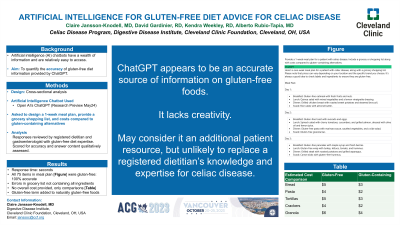Tuesday Poster Session
Category: Small Intestine
P4103 - Artificial Intelligence for Gluten-Free Diet Advice for Celiac Disease
Tuesday, October 24, 2023
10:30 AM - 4:00 PM PT
Location: Exhibit Hall

Has Audio

Claire Jansson-Knodell, MD
Cleveland Clinic
Cleveland, OH
Presenting Author(s)
Claire Jansson-Knodell, MD1, David Gardinier, RD, LD2, Kendra Weekley, MS, RD1, Alberto Rubio-Tapia, MD2
1Cleveland Clinic, Cleveland, OH; 2Cleveland Clinic Foundation, Cleveland, OH
Introduction: Artificial intelligence chatbots possess and have the ability to distribute a wealth of information. With the relative ease of their accessibility patients may access them as a resource. We aimed to quantify the accuracy of gluten-free diet information on celiac disease (CD) provided by ChapGPT.
Methods: We performed a cross-sectional analysis of OpenAI’s ChatGPT (Research Preview May24 Version) response to designing a 1-week meal plan for a patient with celiac disease. Information was sought on a grocery shopping list along with costs compared to gluten-containing alternatives. Responses were reviewed by a registered dietitian with expertise in the gluten-free diet and a gastroenterologist with clinical and research expertise in celiac disease. Scores were given for accuracy of information and qualitative assessments were obtained for answer content.
Results: Responses were generated within seconds [Figure]. Each of the 3 meals and 1 snack for the 7 days was gluten-free per expert dietitian and gastroenterologist. None of the 75 individual items listed contained gluten making the chatbot 100% accurate. Errors were noted in the grocery list not containing all ingredients to prepare meal and snack items (example no mozzarella cheese listed for making caprese salad). No overall cost was provided for the weekly meal plan. Instead, cost comparisons were noted between gluten-free bread, pasta, tortillas, crackers, and granola and their gluten-containing counterparts. Issues with responses include vagueness (no brands, products, recipes), repetitiveness, no personalized preferences, and lack of culture-specific recommendations. Inconsistency was seen in terms of adding gluten-free qualifier to foods that are naturally gluten-free such as hummus and popcorn. Quality was felt to be nutritionally adequate and well-balanced.
Discussion: This cross-sectional study revealed that ChatGPT appears to be an accurate source of information on gluten-free foods. While artificial intelligence is able to distinguish between foods with and without gluten, it unsurprisingly lacks creativity. It may be an additional patient resource but is unlikely to replace a registered dietitian’s knowledge and expertise for celiac disease.

Disclosures:
Claire Jansson-Knodell, MD1, David Gardinier, RD, LD2, Kendra Weekley, MS, RD1, Alberto Rubio-Tapia, MD2. P4103 - Artificial Intelligence for Gluten-Free Diet Advice for Celiac Disease, ACG 2023 Annual Scientific Meeting Abstracts. Vancouver, BC, Canada: American College of Gastroenterology.
1Cleveland Clinic, Cleveland, OH; 2Cleveland Clinic Foundation, Cleveland, OH
Introduction: Artificial intelligence chatbots possess and have the ability to distribute a wealth of information. With the relative ease of their accessibility patients may access them as a resource. We aimed to quantify the accuracy of gluten-free diet information on celiac disease (CD) provided by ChapGPT.
Methods: We performed a cross-sectional analysis of OpenAI’s ChatGPT (Research Preview May24 Version) response to designing a 1-week meal plan for a patient with celiac disease. Information was sought on a grocery shopping list along with costs compared to gluten-containing alternatives. Responses were reviewed by a registered dietitian with expertise in the gluten-free diet and a gastroenterologist with clinical and research expertise in celiac disease. Scores were given for accuracy of information and qualitative assessments were obtained for answer content.
Results: Responses were generated within seconds [Figure]. Each of the 3 meals and 1 snack for the 7 days was gluten-free per expert dietitian and gastroenterologist. None of the 75 individual items listed contained gluten making the chatbot 100% accurate. Errors were noted in the grocery list not containing all ingredients to prepare meal and snack items (example no mozzarella cheese listed for making caprese salad). No overall cost was provided for the weekly meal plan. Instead, cost comparisons were noted between gluten-free bread, pasta, tortillas, crackers, and granola and their gluten-containing counterparts. Issues with responses include vagueness (no brands, products, recipes), repetitiveness, no personalized preferences, and lack of culture-specific recommendations. Inconsistency was seen in terms of adding gluten-free qualifier to foods that are naturally gluten-free such as hummus and popcorn. Quality was felt to be nutritionally adequate and well-balanced.
Discussion: This cross-sectional study revealed that ChatGPT appears to be an accurate source of information on gluten-free foods. While artificial intelligence is able to distinguish between foods with and without gluten, it unsurprisingly lacks creativity. It may be an additional patient resource but is unlikely to replace a registered dietitian’s knowledge and expertise for celiac disease.

Figure: One-day meal plan response shown
Disclosures:
Claire Jansson-Knodell: ClearPoint Neuro – Stock-publicly held company(excluding mutual/index funds). DarioHealth – Stock-publicly held company(excluding mutual/index funds). DermTech – Stock-publicly held company(excluding mutual/index funds). DiaMedica Therapeutics – Stock-publicly held company(excluding mutual/index funds). Exact Sciences – Stock-publicly held company(excluding mutual/index funds). Inari Medical – Stock-publicly held company(excluding mutual/index funds). Nano-X Imaging – Stock-publicly held company(excluding mutual/index funds). Outset Medical – Stock-publicly held company(excluding mutual/index funds). PavMed – Stock-publicly held company(excluding mutual/index funds). Takeda - AGA Research Scholars Award – Grant/Research Support. Transmedics – Stock-publicly held company(excluding mutual/index funds).
David Gardinier indicated no relevant financial relationships.
Kendra Weekley indicated no relevant financial relationships.
Alberto Rubio-Tapia indicated no relevant financial relationships.
Claire Jansson-Knodell, MD1, David Gardinier, RD, LD2, Kendra Weekley, MS, RD1, Alberto Rubio-Tapia, MD2. P4103 - Artificial Intelligence for Gluten-Free Diet Advice for Celiac Disease, ACG 2023 Annual Scientific Meeting Abstracts. Vancouver, BC, Canada: American College of Gastroenterology.
